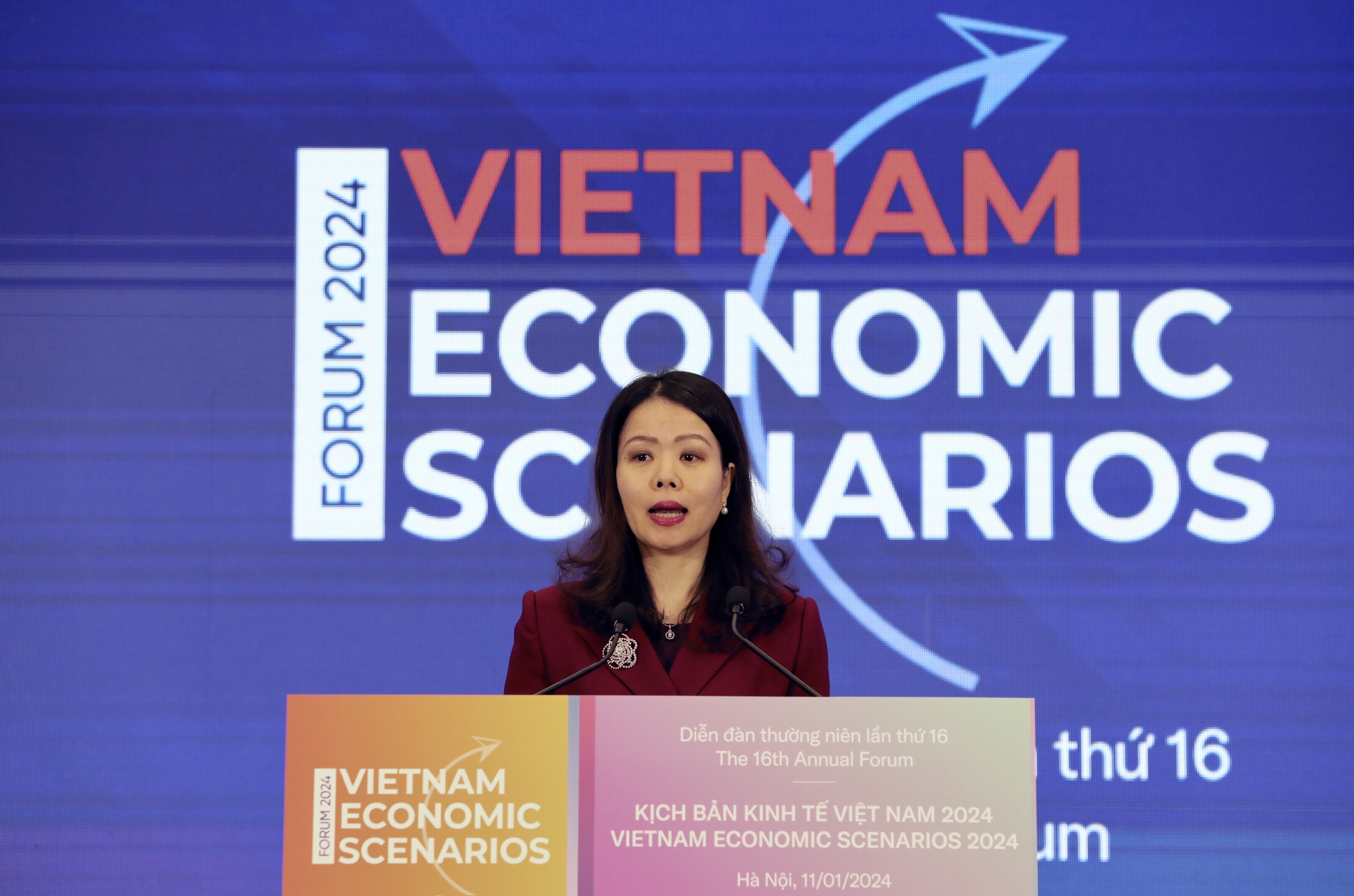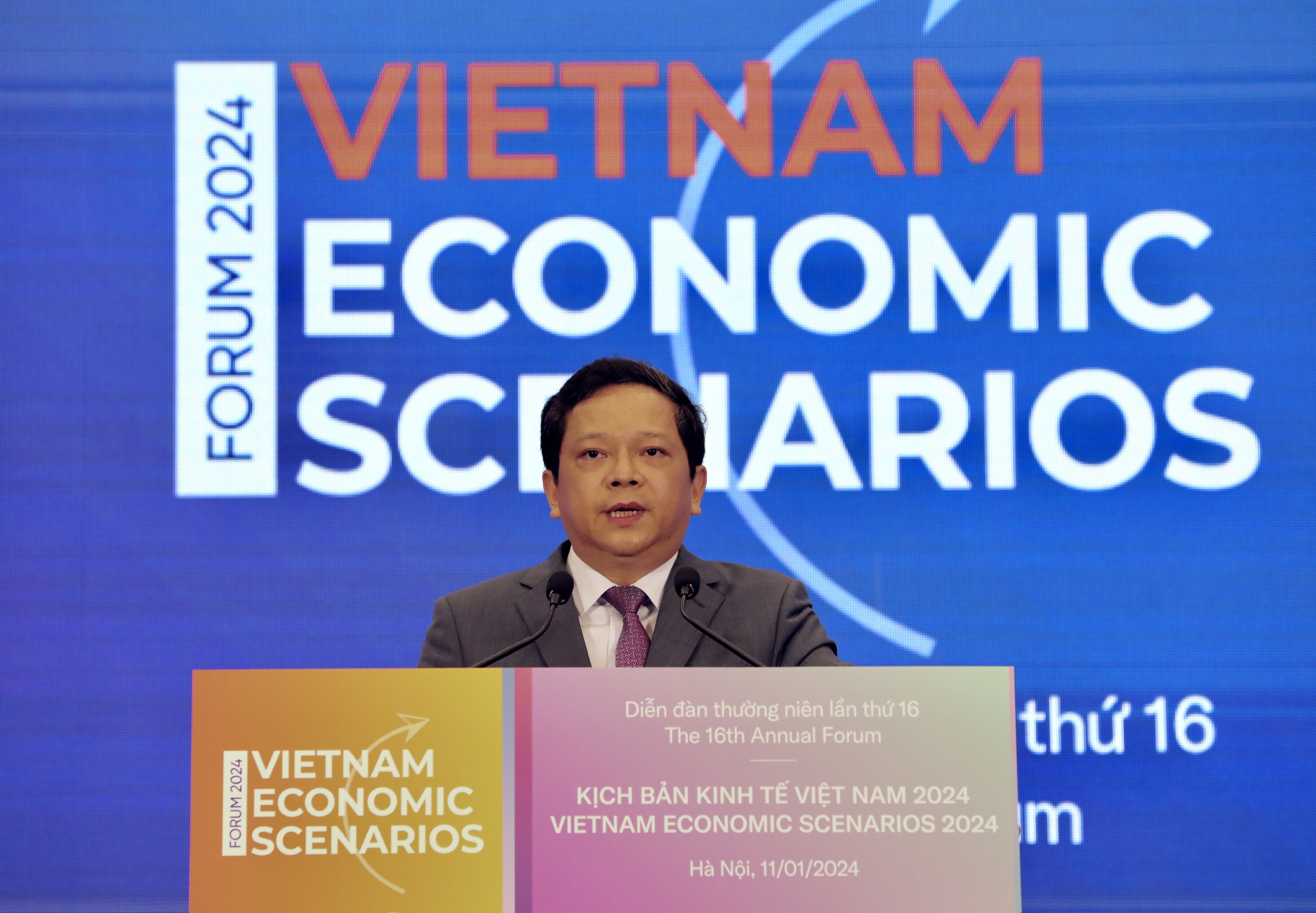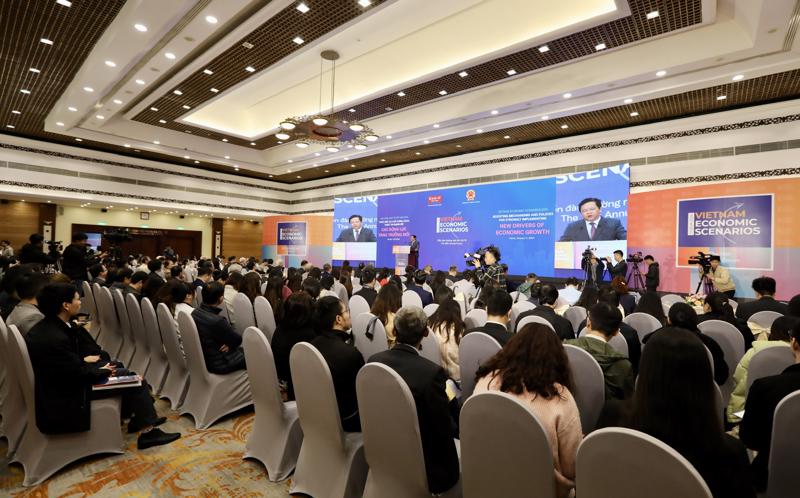The Vietnam Economic Scenario Forum 2024 was held in Hanoi on January 11, with the theme “Promoting mechanisms and policies, vigorously implementing new growth drivers”. This 16th edition was jointly organized by VnEconomy / Vietnam Economic Times (VET) and the Ministry of Foreign Affairs (MoFA).
The annual gathering serves as a platform for information exchange, dialogue, and policy recommendations regarding the activities of economic sectors in the context of both the global and Vietnamese economies, synthesizing observations, analyses, and evaluations of favorable factors, challenges, opportunities, and difficulties faced by the economy and the country’s business sector, and offering recommendations to policymakers, administrators, local leaders, and the business community to effectively realize Vietnam’s socio-economic development objectives.

Delivering her opening remarks, Deputy Minister of Foreign Affairs Nguyen Minh Hang noted that this year’s Forum is of great significance, considering that 2024 is the “acceleration” year for achieving goals within the Socio-economic Development Plan 2021-2025. This period is crucial in moving towards the broader development goals to be met by 2030. As a reputable annual event held early in the year, the Vietnam Economic Scenario Forum contributes significantly by forecasting global and regional growth prospects, looking at adjusted policies in various countries, and assessing their impact on Vietnam. It also provides groundbreaking solutions for future development.
A year ago, the Forum foresaw a challenging global economic landscape, laden with risks and the potential for recession. The reality of 2023 affirmed such predictions, with heightened complexity, especially in political conflicts. Despite this, Deputy Minister Hang highlighted that at the Conference on 2023 Performance Review and 2024 Tasks Dissemination, the government acknowledged achievements in Vietnam such as macro-economic stability, social welfare, and positive economic indicators. These include GDP growth outperforming global and regional averages, agile policy responses, and commendable foreign affairs activities, as acknowledged by the Party and State.
The 32nd National Diplomatic Conference in late December offered comprehensive insights into global and regional dynamics. The global stage is evolving into a multipolar, multilayered, and multilateral landscape. Looking ahead to 2024, the global economy is anticipated to undergo significant shifts. Firstly, it is in a transformative phase, marked by heightened uncertainty and instability, with over 70 elections worldwide expected to drive notable economic policy adjustments. The World Bank’s Global Outlook projects 2.4 per cent global GDP growth in 2024, raising questions about whether the “bottom of the downturn” has been reached. Secondly, geopolitics are increasingly complex, with growing hotspots posing challenges, particularly as economic fragmentation deepens. Thirdly, international economic links are swiftly changing amid green transition and sustainable development trends, creating new challenges for developing countries in terms of competitiveness and adaptation.
“Given the global context and the developmental needs of Vietnam at this juncture, the Forum’s theme is highly fitting and precise, and aligns with government guidance and business requirements,” Deputy Minister Hang said. “I anticipate that during today’s Forum, committees, ministries, local entities, businesses, and economists will engage in discussions and put forth recommendations, contributing specific ideas on two pivotal aspects. These encompass foundational elements and play transformative roles in Vietnam’s upcoming development.”

Meanwhile, Deputy Head of the Party Central Committee's Economic Commission, Nguyen Duc Hien, underscored that the annual Forum consistently delivers vital debate and insights. These prove instrumental for the Party Central Committee's Economic Commision and various ministries in shaping policies for the Party, government, and agencies of the National Assembly. Mr. Hien expressed his appreciation of the Forum’s content, which introduced several open-ended issues to encourage analysts and scientists to provide insights, as follows.
Firstly, recent GDP growth is primarily driven by significant public sector investment, with private investment at a low 2.7 per cent in 2019-2023. Driving private investment is crucial, prompting the question of which policies to implement.
Secondly, the industrial sector has lost its leading role despite past contributions. Policy mechanisms are needed to revive the sector, especially in manufacturing and processing, given Vietnam’s growth dependence on FDI and exports.
Thirdly, the service sector contributed 6.82 per cent to economic growth in 2023, mainly from international visitors. Policy mechanisms are needed to meet service sector requirements, especially in increasing value and promoting crucial service industries.
Fourthly, Vietnam posted a trade surplus in 2023, due in part to lower imports, signaling economic self-sufficiency. Discussions are needed on this narrative and leveraging free trade agreements (FTAs) and exploring new markets and export strategies.
Fifthly, employment and livelihoods are improving, but one-time unemployment insurance payouts rose to 1.05 million cases in 2023. Sustainability of employment, especially in different industries, requires discussion.
Finally, the sixth issue pertains to the digital economy in 2023, which contributed significantly to the overall economy with 19 per cent growth. Examining how to genuinely shift towards digital transformation in smart manufacturing is essential, moving beyond reliance on electronics exports for added value.
This year’s Forum, the 16th of its kind, was structured into three sessions: a Keynote Session and two Discussion Sessions. The Keynote Session comprised three keynote addresses from international and Vietnamese economists, covering the following topics: the Global and Vietnamese economic outlook for 2024; Vietnam’s economy in 2023-2024 from the perspective of new growth drivers; and Vietnam’s key growth drivers in the new phase. The addresses focused on sharp analyses of the achievements, limitations, challenges, and difficulties in world economies. With a multidimensional approach, in-depth research, independence, theoretical rigor, and a scientific connection to reality, the economists’ perspectives, insights, and evaluations provided reliable reference points for stakeholders.
The first Discussion Session, with the theme “The new global context - Challenges and new growth drivers for Vietnam”, featured the participation of high-level economists from the World Bank in Vietnam, the UOB Group, HSBC Vietnam, Deloitte Vietnam, and Dragon Capital. It focused on analyzing issues related to the prospects for a soft landing and recovery of global economic growth and growth in major economies such as Russia, the US, the EU, Japan, and China, and their impact on Vietnam. The session assessed the global landscape and significant factors influencing the direction and speed of growth recovery, as well as global supply chains and international trade.
The first Discussion Session also addressed and analyzed new growth drivers for Vietnam’s economy, and identified trade and investment opportunities arising from these. Additionally, analysts discussed new challenges related to regulations and green standards in import markets, exploring the pressure on and motivation for Vietnamese enterprises to expedite the green transition.
The second Discussion Session, entitled “Boosting mechanisms and policies to unlock internal drivers and new growth drivers”, heard insights from representatives of the Central Economic Committee, the National Assembly Economic and Budget Committee, the State Bank of Vietnam, the Vietnam Chamber of Commerce and Industry, the Vietnam Textile and Apparel Association, and the European Business Association in Vietnam. Topics encompassed government and central bank directives on monetary and credit policies to facilitate businesses and citizens, how fiscal recovery policies will continue to be implemented in 2024, and the impact of existing laws or laws being prepared by the National Assembly on the activities of economic sectors, businesses, and citizens.
With specific issues raised, the second Session also focused on evaluating the potential for revitalizing existing growth drivers and efficiently exploiting current and future growth drivers. It aimed at identifying the challenges that economic sectors and the business community are facing and propose solutions to overcome them.









 Google translate
Google translate